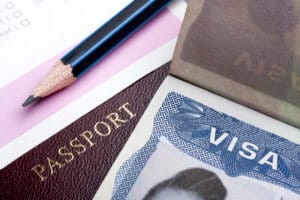
July 6, 2021
As an immigration attorney, clients often ask what types of visas are available in order to live and work in the United States. The answer is that there are only two ways to live and work in the U.S. – through family or through work.
Visa Through Family
Through family, you would need a United States Citizen (USC) spouse, parent (of a USC, age 21 or older), or child (unmarried and under age 21) who can file a petition on your behalf. These types of petitions are called immediate relative petitions and are usually processed faster than other family petitions. In addition to immediate relative petitions, family petitions may be filed by a USC or Lawful Permanent Resident (LPR), which are subject to preference categories and normally take several years to be processed.
Under the preference categories, a USC may file a petition on behalf of their unmarried children over age 21, married children, and siblings. LPRs may file a petition for their spouses and children (under 21 years of age) and unmarried sons and daughters (over 21 years of age). Family petitions filed under the preference categories are subject to yearly numerical limitations per category and are issued to eligible immigrants in the order in which the petition has been filed.
Visa Through Employment
In order to come to the United States through work, generally, you need to have an employer sponsor you and file a petition on your behalf. Keep in mind that the majority of work visas are non-immigrant visas, meaning that they only allow a foreign national to work and reside in the United States on a temporary basis, depending on the type of visa. For example, the holder of an H1B visa, available to individuals in specialty occupations, may reside and work in the U.S. for a maximum of six years in H1B status. Furthermore, the L1A visa, available to multi-national managers and executives, is usually approved for an initial period of stay of three years and may be extended in increments of two years until the employee has reached a maximum stay of seven years.

Labor Certification
There is also the option of obtaining permanent residence in the United States through work via a labor certification. An employer would need to apply and receive a certification from the U.S. Department of Labor (DOL) certifying that the foreign employee’s skills are in short supply in the area of intended employment and that said employment would not adversely affect the wages and working conditions of other U.S. workers similarly employed. The DOL requires employers to take affirmative steps to recruit U.S. workers for the position a foreign national seeks to fill. If the employer is unable to recruit a suitable U.S. worker and receives DOL certification, the employer may then file an immigrant visa on behalf of the foreign worker, which should ultimately lead to permanent residency.
Contact Us For More Information
If you need more information on the types of visas available, contact us. Casais & Prias has served the area for over ten years and is equipped with the knowledge and experience needed to help you.